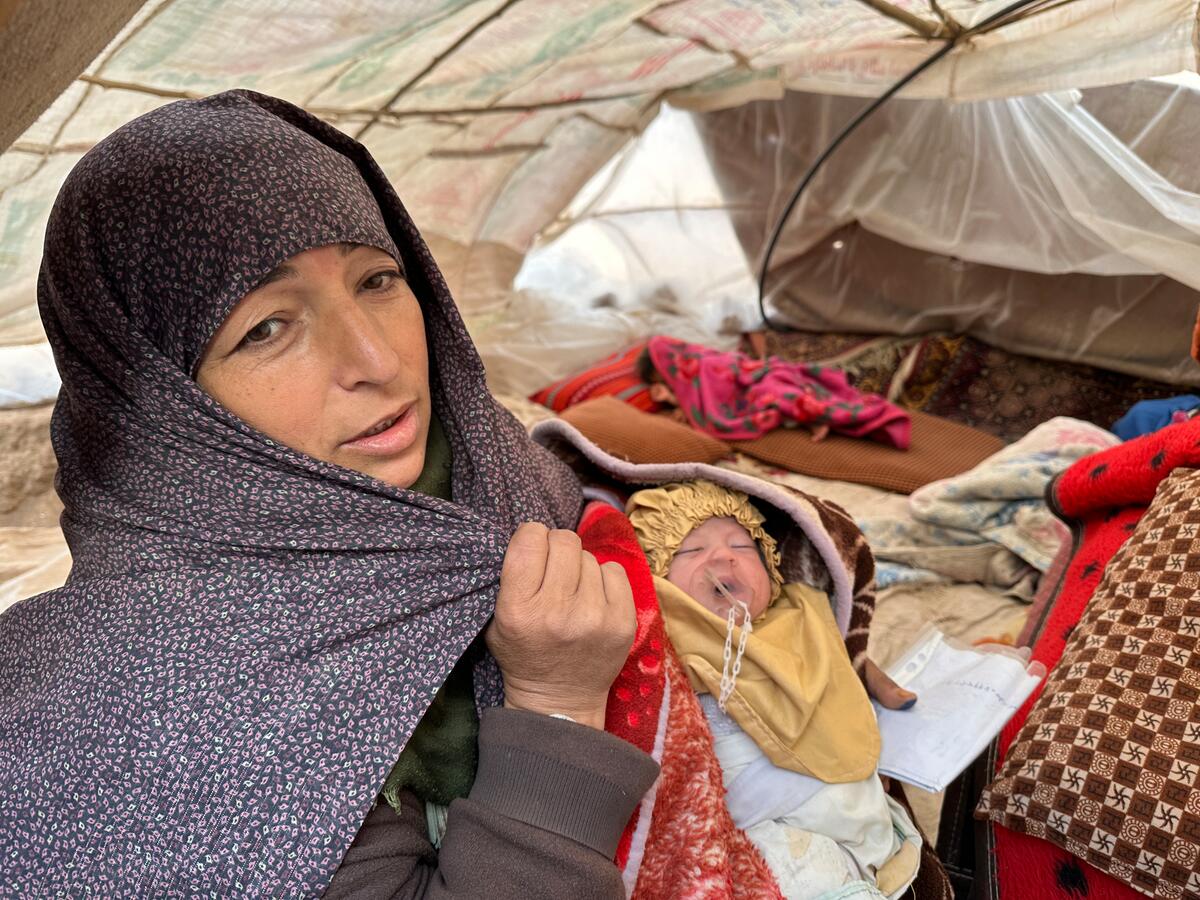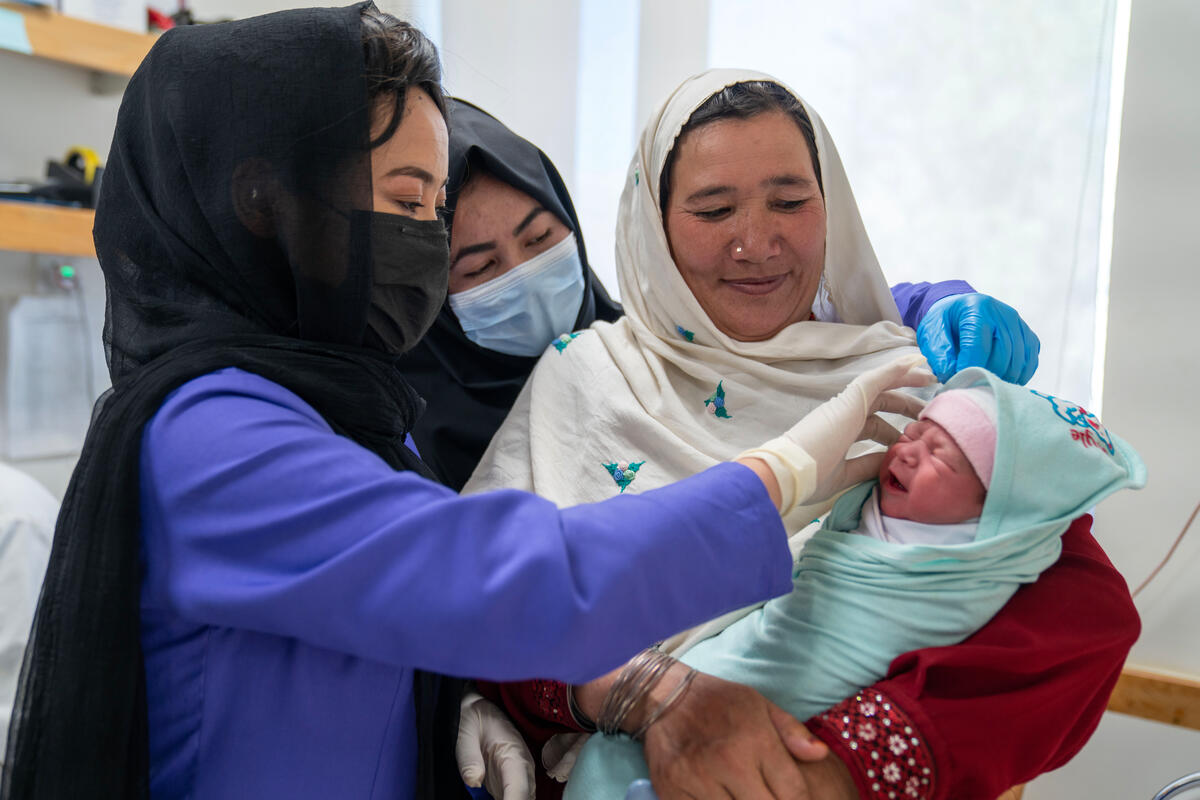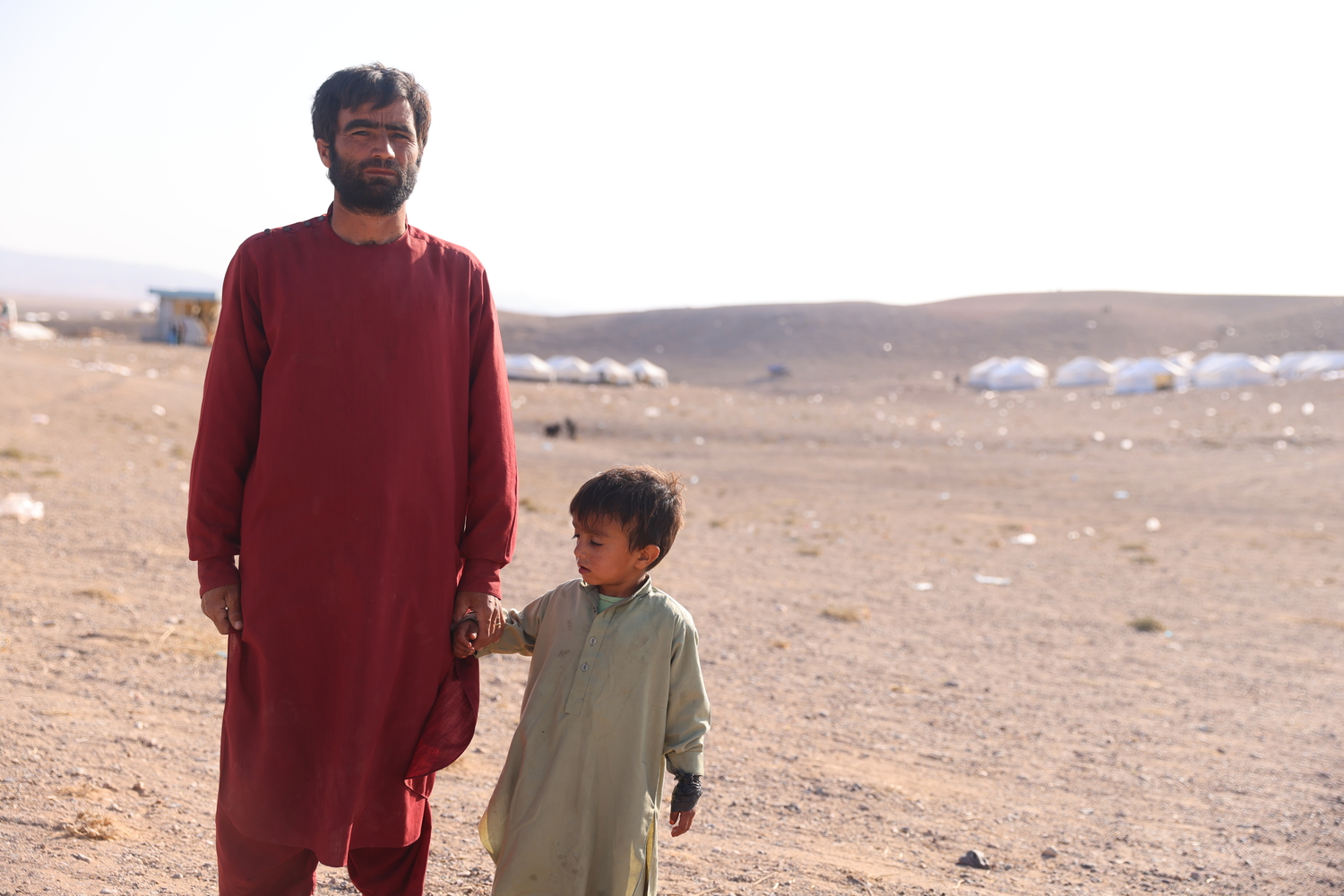Afghanistan Humanitarian Update No. 21
Afghanistan Humanitarian Update No. 21
At a Glance:
- More than 3,500 Afghans flee to Pakistan's Baluchistan province as of midday Friday, bringing estimated total arrivals in the province over the past week to more than 13,500
- UNHCR teams identifying recent arrivals in Pakistan's North-West Frontier Province
- Site assessments continue in Iran
- Four more relief flights to Pakistan
- Funding problems
Influx into Pakistan's Baluchistan Province
UNHCR was awaiting government authorisation Friday afternoon to provide assistance to more than 3,500 people who had crossed from Afghanistan's Kandahar region into Pakistan at the Chaman border during the morning. More Afghans were reportedly on the way to the border.
Monitors described the situation at Chaman as chaotic. Apparently fleeing in panic, people were arriving with no food or belongings. In the chaos, some families had become separated. Many were still waiting on the Pakistan side of the border Friday afternoon, hoping to find missing family members who fled at the same time. The new arrivals reported fleeing heavy bombardments in Kandahar overnight and Friday morning.
UNHCR was asking central authorities for authorisation to provide water and food to the new arrivals at Chaman.
Friday's influx followed the arrival of some 10,000 Afghans in Baluchistan province over the past six days. They include some 2,700 people who arrived Wednesday and Thursday at Chaman. Many of the Afghans who have arrived in recent days paid smugglers to arrange transport from the Kandahar region up to the frontier and across the border into Pakistan. Others are making their own way across.
People arriving in Baluchistan in recent days have been in poorer health and nutritional condition than in previous weeks. Among the newcomers are many families of women, children and elderly. The new arrivals told UNHCR that men are sending their wives and children to Pakistan and then remaining behind in Kandahar to protect the family home from looting. To pay for the trip, which reportedly can cost up to 2,000 Rupees, they are forced to sell most of their possessions.
New Arrivals Identified in North-West Frontier Province
In Pakistan's North-West Frontier Province (NWFP), UNHCR in Peshawar has fielded nine teams to try to identify new arrivals and evaluate what kinds of assistance they require. The rate of arrivals into NWFP was earlier estimated at some 1,000 per day.
The teams have identified 260 recently arrived Afghan families in the makeshift camp at Jalozai near Peshawar. The families - some 2,300 people - have occupied a new corner of that site, where they are living in miserable conditions. Some of them have relatives already in Jalozai, but those already there have scant resources for themselves, let alone for the newcomers. Many of the new families are headed by women - either their husbands stayed behind in Afghanistan, or they are widows.
UNHCR has also started interviewing Afghans at the UNHCR compound in Peshawar. On Thursday, 50 refugees were interviewed, including some old caseload refugees and some new arrivals. The new arrivals are Pashtun from Kabul or Jalalabad.
New arrivals in NWFP report having to pay as much as 3,000 Rupees ($50) to get to Pakistan. They travel from Kabul to Jalalabad by vehicle and then take a 15-hour trek by foot across mountains with smugglers. Some report that they decided to leave because air strikes are taking place during daytime hours now as well as at night. They say daytime bombing means life has come to a halt, with people unable to work or look for food. Others report leaving out of fear of forced conscription or concerns that Kabul would fall into the hands of the Northern Alliance.
Pakistan Site preparations
In Baluchistan province, work on water systems in the Darra and Roghani sites resumed Thursday. Oxfam, UNHCR's partner for water installations, sent staff to the sites to repair and extend the traditional underground water systems known as "karezes." Works had been interrupted for two weeks by security concerns and unresolved land ownership issues.
Water from the karezes would serve the needs of both refugees and the local population. To increase water supply, UNHCR is making arrangements with the irrigation department to begin drilling boreholes early next week.
UNHCR and its partners who are rushing to ready the Darra and Roghani sites for a possible new influx have been working around hundreds of live Soviet-era anti-tank mines and bombs littering the area, including some ordnance dumped in wells at the site.
Iran Site Assessments Continue
In Iran, there are strong indications that the Iranian Red Crescent Society will be unable to operate any camps in Taliban-controlled territories in Afghanistan. Since Iran closed its 900-kilometre border with Afghanistan, the policy of the Iranian authorities has been to try to provide assistance to Afghans inside Afghanistan. As a result of the latest developments, however, the focus is now shifting to the nine identified possible campsites in no-man's land. Six of the sites are in Iran's Khorasan Province and three are in Sistan Baluchistan Province.
A UNHCR/THW (Technische Hilfswerke) water assessment mission to possible campsites concluded on Wednesday. Initial findings indicate that most of the sites are remote, harsh desert locations where water would have to be brought in by tankers from the distant wells. In case of a significant refugee influx, the logistics could become extremely complex. In general, because of the insufficient water supplies, the locations can be considered as immediate options for only a limited number of people for a short time.
In the longer term, wells could be drilled to provide adequate quantities of water, but this would take time. Wells would also benefit the local Iranian communities along the border, which have been seriously affected by the long drought and refugee movements in previous years.
A health and sanitation interagency assessment mission is also underway in Iran, visiting potential campsites along the border. UNHCR also continues deploying emergency staff to the area and stockpiling relief supplies.
On Wednesday, UNHCR met with officials of the Iranian Red Crescent society (IRCS) in Khorasan Province bordering Afghanistan to discuss a planned registration system for potential new Afghan arrivals. UNHCR outlined its registration approach in Pakistan and shared samples of registration documents.
An IRCS-administered camp at "Mile 46," seven kilometres inside Afghanistan in a pocket controlled by the Northern Alliance, remains in use. According to reports from relief workers who have managed to visit the camp, there are presently 108 families totalling 473 people at the camp. Some have come from as far away as Kabul and Jalalabad. Roughly half are elderly, weak or in need of medical treatment, and some are malnourished. Medical staff from the Iranian Ministry of Health and IRCS are present in the camp. New arrivals reportedly receive food on a daily basis for the first three days, followed by monthly food rations. Water is brought in by tankers from the nearest water source in Iran, an hour and a half drive away.
Meanwhile, Afghans continue spontaneously returning to Afghanistan from Iran daily. The scale of returns varies each day: 720 returned on October 13, 435 on October 15, 108 on October 16, and 747 on October 17. In total, over 2,300 have returned over the past week.
Airlifts / Movement of Supplies
UNHCR's 11th airlift into the region arrived this morning in Quetta, Pakistan, with more than 10,000 blankets and some 6,200 plastic tarpaulins. A shipment of 75 tents donated by Germany was also scheduled to arrive this morning in Islamabad.
A plane with 13 Rubbhall portable warehouses, registration materials, and 9,675 plastic tarpaulins is scheduled to arrive in Quetta from Oslo tomorrow (Saturday). Also on Saturday, a flight is expected in Islamabad from South Korea with a donation of 2,400 tents, 10,000 blankets and 1,000 winter jackets. Some 30,000 blankets donated by the United States are also expected to arrive in Islamabad soon.
Funding problems
UNHCR's Afghanistan emergency operation is still facing serious financial problems, with only $12 million in cash contributions received so far. An initial $50 million is needed for the first phase of the operation, aimed at helping up to 400,000 new arrivals, mainly in Pakistan and Iran.
Some $11 million in pledges from donor governments has yet to be translated into actual cash for operations. At this stage, UNHCR urgently needs donors to come forward with cash contributions and additional donations to enable preparations to go forward for any large-scale influx.
Supplies and equipment pre-positioned in neighbouring countries could be quickly transferred for use inside Afghanistan if no large population movements take place beyond the strife-torn nation's borders.








